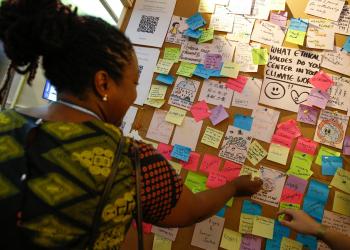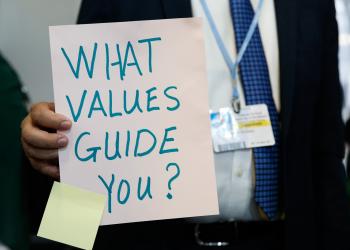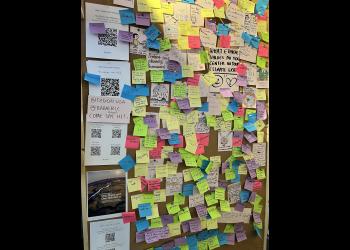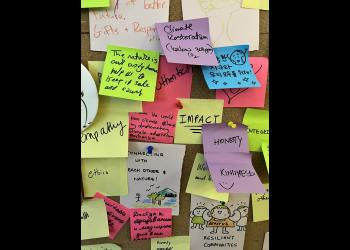Putting Values to Work in an Age of Climate Change
By Daniel Perell
“What ethical values do you center in your climate work?”
The Baha’i International Community United Nations Office posed this question to hundreds of participants at the COP27 climate change conference earlier this month. We hoped for reflections not just on technical approaches and policy positions, but on the ideals and vision of the future that sustain us in committed action over time. And the results were telling.
Over 340 hand-written messages and sticky-note drawings, posted to our “Values Wall”, spoke to some of the deepest aspirations of those involved in climate action. The posts uncover a wide diversity of animating values but also a striking coherence and convergence around key themes.
The way our societies are organized, for example, as reflected through values such as justice, equity, and equality, was mentioned in 14% of the responses. And the way human beings relate to one another, through qualities such as honesty, integrity, and respect, was mentioned in 14% of the notes. Our feelings toward one another, meanwhile, as articulated through values such as love, empathy, kindness, and solidarity, was mentioned in 17% of the responses.
Those who left their values on the wall came from many walks of life, ages, geographic backgrounds, and roles and functions at COP. But the language that emerged was shared. The value of this common resource should not be overlooked, particularly as COP 27 once again raised all-too-familiar questions—Are these gatherings worthwhile? What do they have to show? Where is the political will?
COP 21 in Paris was seen by many as a success in part because of the landmark political agreement it produced. Equally significant, though, was the consensus and commitment it built around an enduring set of values shared by the generality of participants, rooted in justice, unity, solidarity, and common cause.
Looking ahead to COP 28 in Dubai, negotiations on funding mechanisms, stocktaking, and similar arrangements will remain central to the work. But if these are negotiated absent the deeper values that need to underlie any true and lasting progress, I fear that disappointment will once again be the result.
Values left unapplied are like a map left unopened—helpful in theory but unfulfilled in practice. We all hold this map of higher moral aspirations and commitments; the wall of values demonstrated this. The question is how these values become embedded deeply enough in our collective consciousness to shape the choices and behaviors of decisionmakers; how these, and others, take hold as the accepted foundations for collective global action. Once we settle on these values—just as when we unfold our map and decide on our destination—it is merely a matter of charting a shared path ahead.
Starting with the values that guide us would yield radically different outcomes from present practices rooted in assumptions of competition and difference. Consensus on matters of principle paves the way for greater willingness to explore hard truths, to see diverse perspectives, and to identify solutions that can gain a wide degree of support and ownership, bridging the gap between words and deeds. Over the coming months, ahead of COP 28 next year, we will return to the values wall from Sharm El Sheikh and explore how to reshape not just our approach to mitigating climate change but to our shared planetary life.
This is far easier said than done, of course; even moving in that direction would require an entirely new approach to negotiation. Yet with every international conference, it is becoming increasingly clear that a global order in which nations, entities, and individuals find common purpose and motivation to move toward a more just and sustainable world can only rest on a foundation explicitly based in the values we cherish. Let us then give this vital consideration the practical and sustained attention it deserves.
Daniel Perell is a Representative of the Bahá’í International Community to the United Nations







